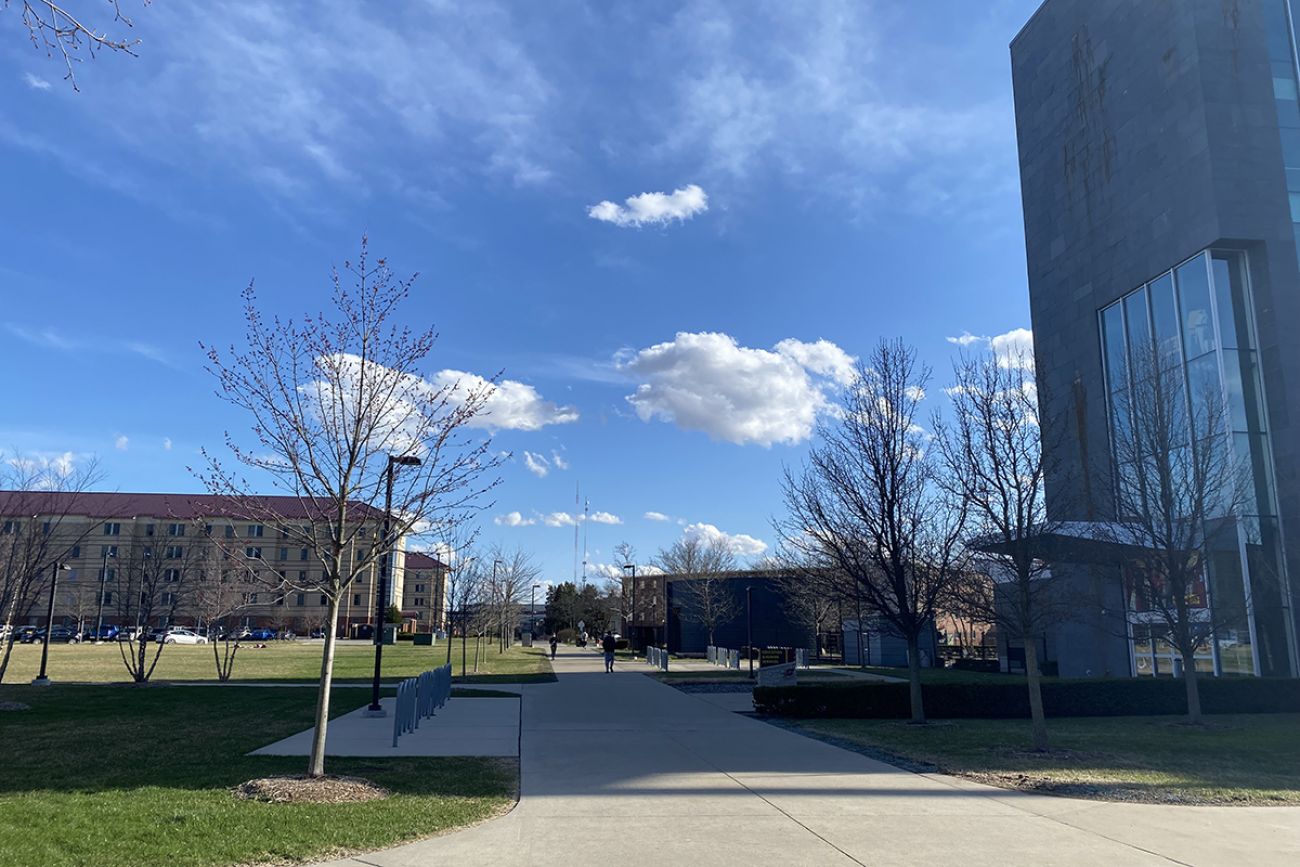Q+A with Central Michigan University leaders on the plan to rebuild school

MOUNT PLEASANT—Central Michigan University President Bob Davies and Board of Trustees chair Richard Studley say they will not shy away from being candid about the university’s declining enrollment and need for new housing — all while working under a tight budget.
The leaders spoke last week to Bridge Michigan after a board meeting where trustees agreed to pause plans to build new student housing aimed as a way to recruit and retain students. As Bridge Michigan reported, the school decided it hadn’t yet found the money to take the next step in the housing project.
So, they say, they are focusing now on upcoming budget decisions.
Related:
- Citing cash crunch, Central Michigan University pauses new student housing
- Shake-up in Central Michigan University admissions after enrollment drop
- New carpets, more supports: How Michigan colleges would spend Whitmer plan
This Q+A has been edited lightly for length and clarity.
Bridge Michigan: So you both have mentioned it, you said it yourself, “enrollment, enrollment, enrollment” is an important component of what CMU is trying to do. Does delaying this (housing) project actually hurt enrollment in the meantime, when you're trying to attract new students?
President Bob Davies: I don't think it does because as we think about moving into September, the construction and everything else along those lines will still be part of the process.

This is not going to be done in one year anyways; it’s a multi-year program and project. But it is also a very strong signal about the way we're thinking about this, the way we're moving forward on this. A symbol to the students and potential students about the direction of the university. And it sends a very strong signal to families as well about where we're going, and the service that we're going to be providing.
Board Chair Richard Studley: We listened. We've reordered the decision-making process. The next challenge we'll address is the budget, again, with a focus on student success. If there's one overarching theme, it's that. How do we encourage and promote and support student success? How do we advance CMU with rigor and relevance and excellence?
The board is very determined to work closely with the president and his cabinet on a budget that makes strategic investments. And at the same time, we're dealing with the twin challenges of declining enrollment and the history, the practice, of state government underfunding regional universities, especially ones like CMU.

And so we're going to do everything we can to overcome those challenges. We can't spend money we don't have. So we'll have to do what students and their parents and the people who work here, our faculty and staff do every day. And we can't spend more money than you have, you have to decide (between) what's necessary and important and what's nice.
And so we'll go through the budget and make strategic investments and work to preserve and protect essential programs. And we will have to take a long hard look at programs that are optional, programs that lack rigor, or relevance or excellence. We have to make investments where there's a positive return in terms of student success.
Davies: One thing too, since you brought up enrollment: We are seeing a positive turn in the response of students to enrollment for next fall.
It is early. These are projections. But the number of students who have made that commitment to come to CMU in the fall, our first time at-any- college freshman, our transfer students, our international students, all of those markers are up.
That is establishing that our strategies within the admissions team are starting to pay off, our branding efforts, the way we're presenting the university to potential students and their families is starting to take hold.
As mentioned by one of the trustees, this is something we started three years ago, it takes time to reverse that momentum. And to have these indicators “green,” as we call them, that the dots are green, for the first time in six years is very, very encouraging. So we are making some initial strides.
We still have challenges. We're an institution of higher education. We are proud that we have increased our four-year graduation rate, we are graduating students quicker than we had before. And that's a wonderful, wonderful thing. On May 7, coming up, we will graduate 2,509 students, that's wonderful. That's what we're here for. 2,509 is a little bit more than what we're projecting for new students. So we have a math problem, you can figure that out. But what we’re saying though, with that uptick, we’re seeing some major changes, and we're going to get to the point where we'll be a lot more stable within our enrollment. And that's what our ultimate goal is.
Studley: Here at CMU, the administration and the board are being open and honest and very direct about the challenges that we face. But we are confident that there's a bright future, we do have to make some tough decisions. Another advantage of temporarily hitting the pause button on the go/no-go decision for the Washington Commons (housing) project is it gives us three more months to look to see if these preliminary indications are positive and continue to hold. Is it a trend that we can count on for this year or next year?
Bridge: So you mentioned the chronic underfunding of public (education) institutions across Michigan. We're in budget season right now. What does CMU need from the state government and state lawmakers in order to carry out its mission?
NOTE: Michigan’s public universities receive varied levels of state funding, ranging from $3,200 per student to $9,400 per student in fiscal year 2021, according to an analysis provided by the Michigan Association of State Universities. CMU’s rate was $5,748. This rate does not include one-time supplemental payments from the state. Davies wants the funding to be more equitable.
Davies: Public higher education does provide private benefits, no question. Students who come to universities, like a CMU, get great value, and do great things for their personal life. But there's also a huge public benefit. And we would hope that the state would invest in that public benefit of individuals being more civically engaged, individuals being more apt to be helpful to other individuals and that philanthropic activity that they bring.
It brings in more tax dollars, it provides more opportunities for employment. It advances healthcare, and that’s something that we're very, very in need of. There’s study after study that shows that investments in regional universities like a Central Michigan University — where we have an outstanding medical school, where we have phenomenal research opportunities — the impact on areas that we have far exceeds what the state is investing into it. Additional investments or resources will make those impacts even more and more meaningful for all the constituencies and all the areas that we serve.
Michigan Education Watch
Michigan Education Watch is made possible by generous financial support from:
Subscribe to Michigan Education Watch
See what new members are saying about why they donated to Bridge Michigan:
- “In order for this information to be accurate and unbiased it must be underwritten by its readers, not by special interests.” - Larry S.
- “Not many other media sources report on the topics Bridge does.” - Susan B.
- “Your journalism is outstanding and rare these days.” - Mark S.
If you want to ensure the future of nonpartisan, nonprofit Michigan journalism, please become a member today. You, too, will be asked why you donated and maybe we'll feature your quote next time!






